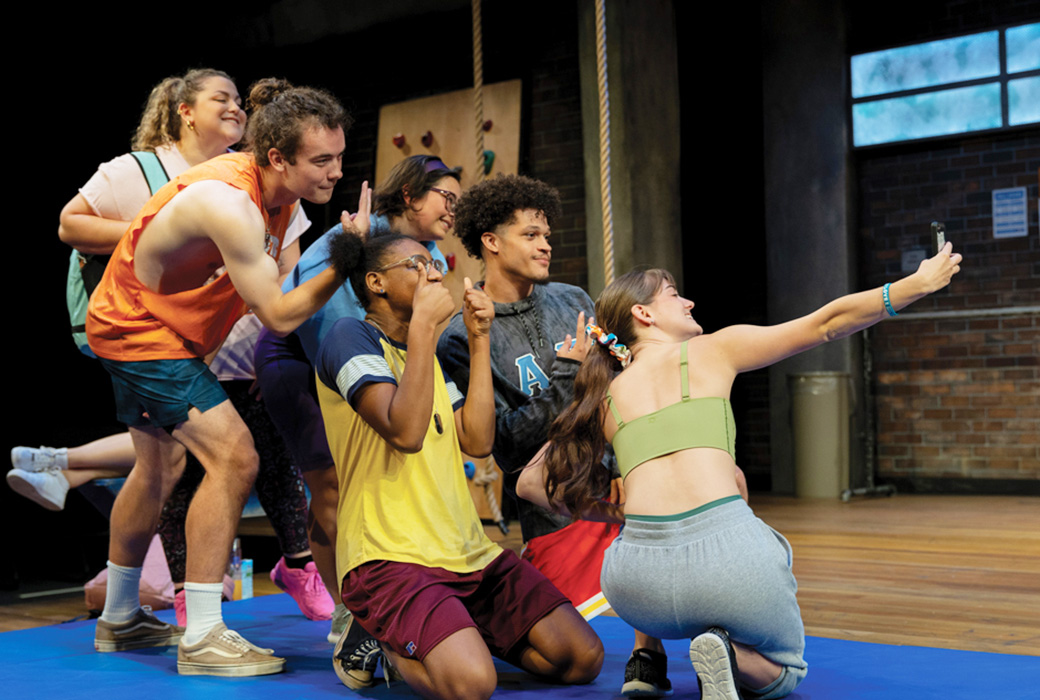The Clarence Brown Theatre presents a troubling and thoughtful recent play, Liliana Padilla’s 2018 How to Defend Yourself, to UTK’s campus, directed by Jayne Morgan. How to Defend Yourself is about just that — a group of college students who join a self-defense class in the wake of the sexual assault of one of their friends. Because this production features discussions of sex, sexuality, and sexual violence, and contains adult language and portrayals of substance use that can be potentially upsetting for viewers, CBT has invited a representative from their community partner, The Sexual Assault Center of East Tennessee, to be present in the lobby during the production. As the play is centered on a college community much like our own—in a vibrant university gymnasium designed by Alondra Castro — we are reminded of how common these types of traumatic experiences are, especially for college students. Collaborating with both community and campus resources, CBT’s How to Defend Yourself has an important message for everyone, but one that seems particularly relevant to UTK’s campus community: both students and educators.
Friends Mojdeh (Suniyah (Sunni) Thomas) and Diana (Allison Hahn), first year college students, join a self defense workshop held by the Zeta Chi sorority in response to the violent sexual assault of fellow sorority member Susannah, who is recovering in the hospital throughout the events of the play. Brandi (Molly Brennan), Zeta Chi’s vice president, and Kara (Alana Mara), sisterhood chair, lead the workshop in the university’s gym and invite two male friends, Eggo (Jordan Goskowicz) and Andy (Trevor Schmitt-Ernst) to participate. Nikki (GG Grigsby), a shy and nerdy student, joins the workshop as well to develop her inner strength as well as her physical strength. As these students try to come together in support of Susanna and each other, difficult issues arise; discussions of sex, violence, consent, agency, and interpersonal communication dominate the workshop more than the self-defense training. Brennan emphasizes Brandi’s own internal, emotional self-defense, leaning heavily into the peppy leadership role to block difficult emotions that the sexual assault of Susannah has welled up in her; her emotional tipping point is a powerful, violent vulnerability. Mara demonstrates an impressive emotional range, from her peppiness as workshop co-leader to standing up for her own sexual desires and the deep guilt of feeling responsible for Susannah’s assault. Thomas’s performance is full of the anticipation for exciting firsts that college life brings, and she switches from earnest eagerness to disappointment when she reveals her date didn’t go as planned. Hahn is the sex-positive college cool-girl, but when she is honest and vulnerable with her best friend Mojdeh (they share a brief kiss), she is met with misunderstanding and revulsion; her confusion is powerful during this scene.

Grigsby conveys Nikki’s growth throughout the play both in dialogue and her body language, and her anger at the ineffectiveness of Brandi’s self-defense techniques is palpable and real: she acknowledges that these female characters’ worst fear — the inability to defend yourself — is more of a reality than they may want to admit. Goskowicz deftly portrays Eggo’s frustration with his past romantic and sexual relationships and the difficulties of communicating sexual desire. Within that fear, Goskowicz brings out a deep longing for interpersonal connection. Schmitt-Ernst balances a warm friendliness with frat-guy braggadocio, a male ally who tries too hard but means well. Each student’s relationship with Susannah’s assault perpetrators, Alpha Epsilon brothers Spencer and Tom, creates conflict within the group: Kara dated Spencer previously, Eggo and Andy are fellow Alpha Epsilon brothers, and Andy saw “something” at the party where the assault happened, but he’s not sure what. As these students work out what it actually means to “defend yourself,” the reality of their lives as college students infiltrates the gym setting, and they are tasked with working through their own struggles together.
This production is very physical, and both Fight Director Sam-Claire Bieber and Intimacy Director Casey Sams worked closely together to shift between the myriad physical and emotional moments that put actors in contact with one another. From Brandi’s escape exercises in the workshop to romantic touch and physical violent altercation, this production handles nearly all the ways humans can be physical. Costume design by Tori Niemiec was deceptively simplistic — you’d think it would be the easy to costume actors in athletic clothes for a play set in a gym, but Niemiec does a wonderful job with characterization with these limits, from Kara’s very put-together coordinating yoga set to Nikki’s Spiderman t-shirt and basketball shorts. The design choices overall were cohesive and an honest reflection of what the experience of sexual assault—even if secondhand—can be like for college students of a variety of backgrounds.
How to Defend Yourself forces us into having important, if uncomfortable, conversations—conversations that can change lives and prepare us, in some ways, for the unknown. The production runs until November 10, with showtimes during the week at 7:30pm and on Sundays at 2pm. Tickets available online and at the Clarence Brown’s The Lab Theatre box office on UTK campus.






